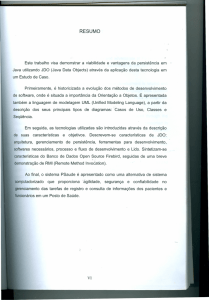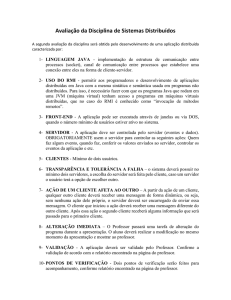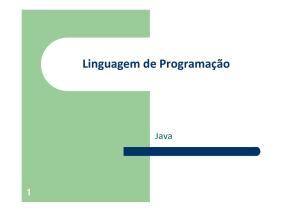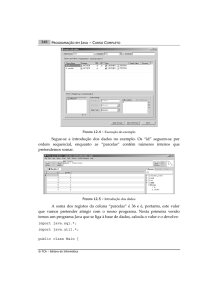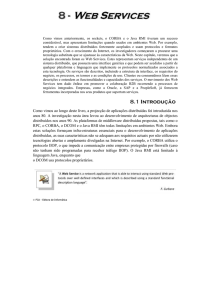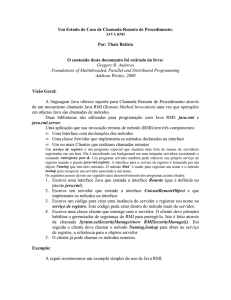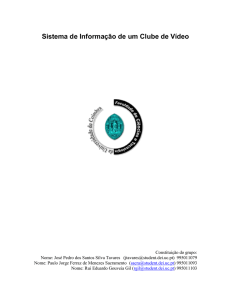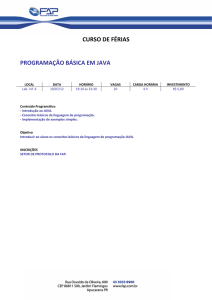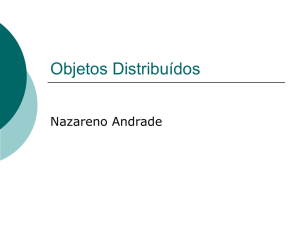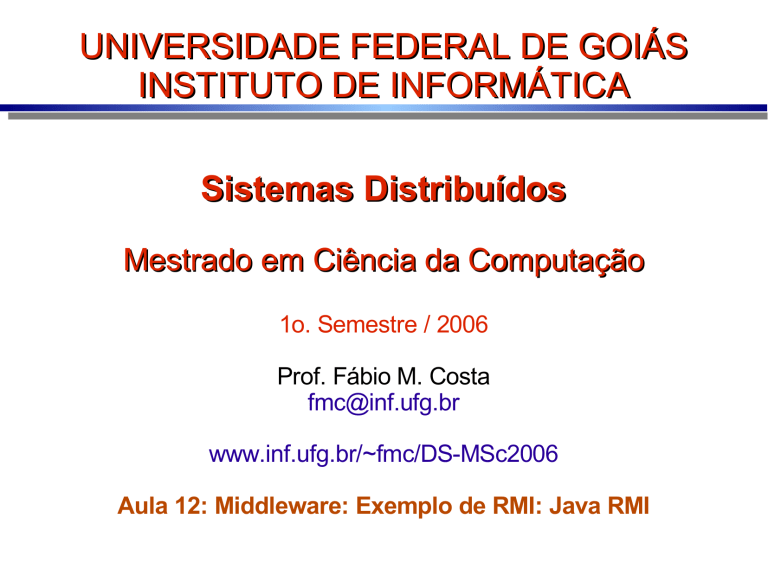
UNIVERSIDADE FEDERAL DE GOIÁS
INSTITUTO DE INFORMÁTICA
Sistemas Distribuídos
Mestrado em Ciência da Computação
1o. Semestre / 2006
Prof. Fábio M. Costa
[email protected]
www.inf.ufg.br/~fmc/DS-MSc2006
Aula 12: Middleware: Exemplo de RMI: Java RMI
Exemplo de RMI: Java RMI
●
Definição de interfaces
●
Implementação do servidor
●
Implementação de objeto
●
Implementação do cliente
Instituto de Informática - UFG
Java RMI: Exemplo de interface
import java.rmi.*;
import java.util.Vector;
public interface Shape extends Remote {
int getVersion() throws RemoteException;
GraphicalObject getAllState() throws RemoteException;
1
}
public interface ShapeList extends Remote {
Shape newShape(GraphicalObject g) throws RemoteException; 2
Vector allShapes() throws RemoteException;
int getVersion() throws RemoteException;
}
Instituto de Informática - UFG
Java RMI: a classe Naming do RMIregistry
void rebind (String name, Remote obj)
This method is used by a server to register the identifier of a remote object by
name, as shown in Figure 15.13, line 3.
void bind (String name, Remote obj)
This method can alternatively be used by a server to register a remote object by
name, but if the name is already bound to a remote object reference an
exception is thrown.
void unbind (String name, Remote obj)
This method removes a binding.
Remote lookup(String name)
This method is used by clients to look up a remote object by name, as shown in
Figure 15.15 line 1. A remote object reference is returned.
String [] list()
This method returns an array of Strings containing the names bound in the
registry.
Instituto de Informática - UFG
Java RMI: Implementação do servidor
import java.rmi.*;
public class ShapeListServer{
public static void main(String args[]){
System.setSecurityManager(new RMISecurityManager());
try{
ShapeList aShapeList = new ShapeListServant();
1
Naming.rebind("Shape List", aShapeList );
2
System.out.println("ShapeList server ready");
} catch(Exception e) {
System.out.println("ShapeList server main " + e.getMessage());}
}
}
Instituto de Informática - UFG
Java RMI: Implementação de objeto
(servant)
import java.rmi.*;
import java.rmi.server.UnicastRemoteObject;
import java.util.Vector;
public class ShapeListServant extends UnicastRemoteObject implements ShapeList {
private Vector theList;
// contains the list of Shapes
1
private int version;
public ShapeListServant()throws RemoteException{...}
public Shape newShape(GraphicalObject g) throws RemoteException {
2
version++;
Shape s = new ShapeServant( g, version);
3
theList.addElement(s);
return s;
}
public Vector allShapes()throws RemoteException{...}
public int getVersion() throws RemoteException { ... }
}
Instituto de Informática - UFG
Java RMI: Cliente
import java.rmi.*;
import java.rmi.server.*;
import java.util.Vector;
public class ShapeListClient{
public static void main(String args[]){
System.setSecurityManager(new RMISecurityManager());
ShapeList aShapeList = null;
try{
aShapeList = (ShapeList) Naming.lookup("//bruno.ShapeList"); 1
Vector sList = aShapeList.allShapes();
2
} catch(RemoteException e) {System.out.println(e.getMessage());
}catch(Exception e) {System.out.println("Client: " + e.getMessage());}
}
}
Instituto de Informática - UFG
Classes que dão suporte a Java RMI
RemoteObject
RemoteServer
Activatable
UnicastRemoteObject
<servant class>
Instituto de Informática - UFG

